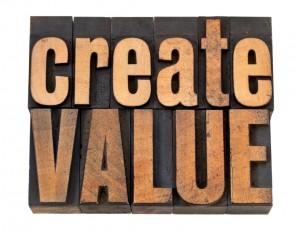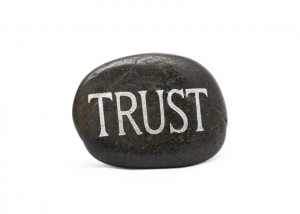Referrals – Don’t Be Afraid to Ask
In last week’s post “ Six Key Words You Want in Every Referral” we discussed the need for referrals and building a strong referral network.
Referrals may be the single most powerful way to grow sales. A referral from a satisfied customer greatly increases the close rate and chances of success by lessening the close time and increasing the new prospect’s level of trust. Just think about the purchases you make simply on the recommendation from a friend.
Remember, most people like to help other people they know, like and trust.
Our customers are no exception. They are willing to help if we would just ask.
In an article by Paul McCord “The 10 Biggest Referral Mistakes Salespeople Make” he says we shouldn’t be surprised “if you don’t ask, you won’t get referrals.” He suggests that nearly 70% of all salespeople don’t ask for referrals or even bring the subject up with their customers.
So, if we know that referrals are one of the most important tools in our sales toolbox, why are we so reluctant to ask for referrals?
Afraid to Ask
I think we are afraid to ask. We fear rejection, being told no or we think our customers may see us as being pushy. We fear if we ask, our customers won’t like us or worse they will stop doing business with us.
Remember what I said above, our customers want to help people they know, like and trust. If we build our sales on integrity and are thought of as being friendly, hardworking, smart, honest and trustworthy, why would our customers not be happy to refer us to others.
Happy customers are happy to help you. Keep this in mind and you’ll have nothing to fear.
Now’s the time to stop making excuses for not building your referral network. Start asking for referrals. I know you will quickly begin seeing the results.
Go ahead, don’t be afraid, just ask!
P.S. – If you have been reading my blog for a while and feel it would be of benefit to your friends, co-workers or other salespeople you know, I would appreciate your recommendation. Your referral would be greatly appreciated.
Thank you for taking the time to read this article.
If you would like, please leave a comment below or you can email me at feedback@wewaonthenet.com.
You can also follow me on Twitter at www.twitter.com/WE_Ward where I tweet articles I come across that I think may be of interest.
If you would like to have future post’s automatically sent to you via email, please sign up below or in the “sign up and connect” section on my website.
You can unsubscribe at anytime.
Now let’s get out there and over-deliver!
Six Key Words You Want in Every Referral
If you asked your best customers to refer you to a friend, what would they say about you?
Would their referral letter or conversation include these six key words:
- Friendly
- Hardworking
- Smart
- Honest
- Integrity
- Trust
Would they say or include a phrase like “you can always count on him doing what he says he will do.”
Maybe, more importantly is what would you hope they wouldn’t say?
Are you ready for a test?
What would you say if you were to refer yourself to a friend?
So go ahead, write your own referral. Be honest.
Does your referral include some or most of the six key words above?
If not, start asking yourself why and what do I need to start doing to get these key words included in my referral.
Does your referral have some things you wish you could change? (Only if you were completely honest.)
Again, you need to ask yourself why and what do I need to start or stop doing to have these removed from my referral.
I know I have asked lots of questions in this article without including any answers.
Conclusion:
A timely referral and strong referral network is a must for a long and successful sales career. Referrals help shorten the time it takes to be known, liked and trusted.
As I’ve discussed before, our customers must know, like and trust us before we can establish strong relationships.
Without strong lasting relationships, long term success in sales will be hard if not impossible to achieve.
If you haven’t already, now is the time to get to work and begin building your referral resume’. Doing the things to make sure when given a referral it includes all of the six keywords (friendly, hardworking, smart, honest, integrity, trust) and eliminating those words and phrases you wish were not included.
I know my six key words are effective and needed in any referral but it is not an exhaustive list. So if you would, please drop me an email or leave a comment below letting me know “What additional key words or phrases you would like said about you in a referral?” Also, I would like to know what words you don’t want in your referrals.
Thank you for taking the time to read this article.
If you would like, please leave a comment below or you can email me at feedback@wewaonthenet.com.
You can also follow me on Twitter at www.twitter.com/WE_Ward where I tweet articles I come across that I think may be of interest.
If you would like to have future post’s automatically sent to you via email, please sign up below or in the “sign up and connect” section on my website.
You can unsubscribe at anytime.
Now let’s get out there and over-deliver!
Honesty vs. Integrity – The Truth
During this week’s coaching session a discussion “Having integrity vs. being honest and telling the truth” was the topic.
The questions posed were:
“Can you be honest and not have integrity?”
“Can you have integrity and not be honest?”
Like many others, I usually think of honesty and integrity synonymously or having the same meaning.
Honesty and integrity are quite similar. In fact, integrity actually requires honesty.
The dictionary defines honesty as:
“truthfulness, sincerity or frankness; freedom of deceit.”
It defines integrity as:
“adherence to moral and ethical principles; soundness of character; honesty.”
So the difference is:
“Honesty simply means telling the truth, while integrity means doing the right thing whether it benefits you or not.”
I think we can be honest without having integrity but cannot have integrity without honesty.
We should try to live a life where having integrity and being honest is a core belief and a long term goal.
While not always successful, I think I’m getting better.
A few months ago I wrote an article “Learn to Sell Like a Kid”. In this article I discussed how we learn at an early age to do the things needed to get what we want. If it takes a smile, taking your Mom by the hand and showing her what you want or throwing a fit we learn how to sell to get what we want.
The thing that I didn’t mention was we also learn to say what we think others want to hear and not always tell the entire truth. As a teenager I remember (sometimes) only telling my parents what they wanted to hear. I would leave out the little things that I though they didn’t want to hear or things that might make them mad or would get me in trouble. I might have even told a “little white lie” just to make my story more believable.
So what does this have to do with sales integrity and honesty?
As account managers and sales professionals how many times do we do the same? We only want to tell our customers what they want to hear. Often times leaving out the things that might upset them. We are even tempted (willing) to add a “little white lie” to keep the customer from getting mad when we fear we might lose a sale or customer.
I think most of us would agree that when we begin “telling a little white lie” we are stepping across the line of honesty. Agreed?
By not telling the truth we cannot be considered honest.
But is not telling the whole truth or just telling our customers what they want to hear in fear of losing a sale any more honest? Probably not.
By not telling the entire truth or just telling our customers what we think they want to hear certainly fails the integrity definition of willingness to do the right thing whether it benefits us or not.
Honesty vs. Integrity
Honesty is doing the right thing in front of our Customers.
Integrity is doing the right thing when our Customers are not looking.
Conclusion
I’m convinced that without our “Customer’s trust” we cannot be successful sales professionals.
How can we ask to be trusted without being honest and more importantly having the integrity to always do the right thing whether it benefits us or not?
What do you think?
(Thinking back, I wonder just how much my parents really bought into my stories? Probably not as much as I thought. They most likely could see through the fluff.)
I’m embarrassed!
If you would like, please leave a comment below or you can email me at feedback@wewaonthenet.com.
You can also follow me on Twitter at www.twitter.com/WE_Ward where I tweet articles I come across each week that I think may be of interest.
If you would like to have future posts automatically sent to you, please subscribe below or click on the RSS feed button in the upper right hand corner of my website and choose how you would like to receive this blog. You can unsubscribe at any time.
Thank you for taking the time to read this article.
Now let’s get out there and over-deliver!
I Didn’t Have Time – My Default Excuse
How many times each week do you say “I didn’t have time?”
Do you “often” find yourself trying to explain “why you didn’t have time to do what you said you would do?”
Does simply telling your customers, supervisors, family and friends “I didn’t have time” still work or are they beginning to catch on to your default excuse.
Are you really time challenged or is there something else?
Last week a supplier agreed to provide a quote to us on a rather large project by Friday. The supplier went so far as to state “don’t worry we have it covered.” You might have guessed, Friday morning they called and informed us that they would not be quoting the project. When we questioned why, the excuse was “we just didn’t have time.” This was followed by several reasons (excuses) why they didn’t have time but nevertheless we were left scrambling to provide pricing to our customer.
So what did the supplier mean by “didn’t have time.” They knew we were counting on them for pricing. They knew we had made commitments to our customer that depended on them doing what they said they would do. They’ve always told us we are very important to their success.
Couldn’t they have told us sooner they were too busy?
How could they leave us in such a predicament?
Why?
Seth Godin wrote an article in his blog called “I Didn’t Have Time” that may help answer these questions. Here is an excerpt:
“This actually means, “It wasn’t important enough.” It wasn’t a high priority, fun, distracting, profitable or urgent enough to make it to the top of the list.”
We should have known better than to place such trust on them performing. This was not the first time this supplier had told us “they didn’t have time” but maybe it should be their last.
All right, enough of this rant!
I’m guilty of making this same “I didn’t have time” excuse.
I’ve always known at times I use this same excuse but since reading Seth’s Blog I realize “I didn’t have time” has become my default excuse. I suspect it has become yours as well.
I have a hard time saying “no” when asked if I can get something done, only to find myself overcommitted at the end of the day or week. (This usually results in me working late at night or the weekend trying to make sure I do what I said I would do.) But this does not always work. What I find is the things that end up getting done are the things I think are a high priority, fun and most profitable. The other things seem to fall in the “I didn’t have time” bucket.
In sales we are expected to always try to find solutions or a way to get something done. In other words to find a way to say yes. To say “no” is not in the top of our vocabulary.
However, not doing what we say we will do is not acceptable either. So here come the excuses:
- “I didn’t have time.”
- “I would have done what I said I would do if I only had the time.”
- “It’s not my fault I just didn’t have time.”
This is our way saying “what we said we would do is not urgent, fun or important enough to get to the top of our list.” So instead of saying no or telling our customers the true reason, we just say “we didn’t have time.”
Maybe, we should not be so afraid to say no or at the very least let our customers know we don’t or may not have time to do what’s being asked. (I know I’m beginning to waffle.) This would at least give them a chance to find alternatives.
“Consider making the “not enough time” excuse the first excuse rather than the last.”
Our customers should expect and trust that we will do what we say we will do. By not saying no to the things we know we can’t or won’t do, the trust we work so hard to develop will quickly slip away. Much like the loss of trust in our supplier mentioned above.
Always doing what we say we will do and not overcommitting our available time does and will take effort and practice. There will be times that things happen beyond our control but if we are intentional with our commitments and willing to say no, we should be better far more than not.
The next time you find yourself saying “I didn’t have time” ask yourself if time is the true reason or as Seth says “it wasn’t important enough.”
Maybe, I need to take a lesson from our youngest grandson. At 18 months he has the word “No” down pat. If it’s not a high priority to him (like taking a nap or eating his peas) it’s “no”. If it’s not fun or he feels urgent it’s “no”. Heck, for all I know he may already be only committing to the most profitable. One thing for sure he lets you know his intentions without any excuses.
If you would like, please leave a comment below or you can email me at feedback@wewaonthenet.com.
You can also follow me on Twitter at www.twitter.com/WE_Ward where I tweet articles I come across each week that I think may be of interest.
If you would like to have future posts automatically sent to you, please subscribe below or click on the RSS feed button in the upper right hand corner of my website and choose how you would like to receive this blog. You can unsubscribe at any time.
Thank you for taking the time to read this article.
Now let’s get out there and over-deliver!
My 5 Best Advice Ideas for a New Account Manager
This week I was asked to participate in a survey that was intended to identify ways to “Shorten the Learning Curve” of beginning Account Managers.
I probably wasn’t the best person to be asked questions on this topic. Even after all my years of selling, I’m still learning everyday.
One of the questions on the survey was “My 5 Best Advice Ideas for a New Account Manager.”
I thought I would share my responses: (In no particular order)
- Find a mentor. Seek out the best of the best and learn from them.
- Treat sales as a profession not a job. Act like a pro.
- Remember it’s never about you. It’s about your Customer’s wants and needs.
- Do what you say you will do. Always!
- Learn to ask good questions and listen to the answers.
- Have Fun!
Ok, I listed 6 ideas instead of 5.
Heck, I believe you should always try to Over-Deliver.
I guess that makes 7!
If you would like, please leave a comment below or you can email me at feedback@wewaonthenet.com.
You can also follow me on Twitter at www.twitter.com/WE_Ward where I tweet articles I come across each week that I think may be of interest.
If you would like to have future posts automatically sent to you, please subscribe below or click on the RSS feed button in the upper right hand corner of my website and choose how you would like to receive this blog. You can unsubscribe at any time.
Thank you for taking the time to read this article.
Now let’s get out there and over-deliver!
I’m a Worrier and I don’t care much for Kool-Aid
I worry that as our businesses succeed and grow, we will begin drinking too much of our own Kool-Aid, forgetting what really matters.
Let’s get this out first “I’m a worrier.” I sometimes worry about how much I worry.
So when I say I worry about sales “going too good” or hear “we’ve had another record sales year” you know that is just me.
My worry is that when sales and business begins growing and it looks like there is no stopping, we might start drinking our own Kool-Aid so to speak and as we grow we forget to do the things we are doing or have done to be successful.
I’ve seen too many times, businesses and sales professionals that are successful begin to falter and slowly fade simply because they forget what made them successful.
Maybe it’s:
- The personal touch we give our customers as we begin our business that gets lost as we grow.
- We move to a larger location without taking into consideration the effect on our customers.
- We begin making inventory decisions based on inventory value and turns rather than our customer needs.
Or we begin telling ourselves:
- It’s the new processes we’ve put in place and computer programs we’ve purchased that is the reason for the success.
- Maybe we get so bold as to think it’s our Account Managers, Sales Managers, Branch Managers or the new CRM (Customer Relationship Management) software we use that makes us so successful. (I could go on but won’t.)
Certainly many of the points mentioned above are needed as we grow our business and contribute to our success. I believe 100% that our people are one of our most valuable assets and growth is needed in any vibrant, successful and lasting organization. But we must make sure we grow without diluting or forgetting the main ingredient that gives us our success and ability to grow.
Did you notice the common ingredient in all but one of the reasons above is the Customer?
Much like “water” is the main ingredient in the Kool-Aid, it is the Customer that is the main ingredient in any business.
Without Water there is no Kool-Aid!
Without Customers there is no Business!
I worry that we might forget, it is our Customers that makes us successful. Without them nothing else really matters.
If, when making our decisions, planning our growth and patting ourselves on the back about how good we are, we forget to consider our Customers and their wants and needs, we will begin to falter and soon fade.
As I said, I’m a worrier and I worry if not careful we can become victims of our own success. Hence, drinking to much of our own Kool-Aid and I don’t care much for Kool-Aid.
If you would like, please leave a comment below or you can email me at feedback@wewaonthenet.com.
You can also follow me on Twitter at www.twitter.com/WE_Ward where I tweet articles I come across each week that I think may be of interest.
If you would like to have future posts automatically sent to you, please subscribe below or click on the RSS feed button in the upper right hand corner of my website and choose how you would like to receive this blog. You can unsubscribe at any time.
Thank you for taking the time to read this article.
Now let’s get out there and over-deliver!
What Does My Tax Story Have to do with Sales?
Taxes, Sales and Referral Value 
I remember years ago taking my shoebox full of papers and receipts and anything else I may have thought would be needed for tax purposes to Jim my Accountant or maybe better said Tax Preparer. Many times it was just days before the deadline. (I guess I have always been one to procrastinate.)
Jim was our accountant for many years. He almost seemed like family. Jim was always available for questions and advice. For many years, after tax season he and his family would go to our house in the mountains for a much needed rest. Jim was someone we knew, liked and trusted.
As we all know things change. Jim retired several years ago, sold his practice and referred me to another local accountant.
Here’s where the story begins:
The next tax season I got a form letter from the new accountant advising me of the changes (which I already knew) and letting me know I needed to make an appointment to meet with him to discuss my taxes. I did as requested.
A couple of weeks before the tax deadline (not days as I had done in the past) I called and made an appointment to meet with my new accountant to discuss and hand over my tax shoebox. When I arrived I quickly realized that he was very busy and I was just one of many. What a difference. The accountant had his processes and one of them seemed to require sitting in the waiting area for long periods of time.
Once I finally made it back to his office, I was greeted with stacks and stacks of paper mostly bound by large rubber bands. Thinking about it now I’m not quite sure I saw any shoeboxes like mine.
After a very brief introduction, he asked to see what I had brought. He barely knew my name and he was asking me to hand over my most personal information. Heck, I guess that’s why I was there but I remember that feeling uncomfortable as I did as requested. As I pushed my Tax Shoebox across his desk he gave me that look like “you got to be kidding”. You would have thought he had never seen the shoebox filing system I had in place at the time. (I now use a 8×11 envelope as my taxes have gotten much simpler.)
He quickly shuffled through my information, slapped a sticky note on the box, pulled out one of those large rubber bands, wrapped it around my tax box and told me he would give me a call when my tax return was ready.
That was it!
No questions asked, didn’t ask if I had any questions, just said he would call when the return was ready.
A few days before the 15th I got a call from his office letting me know my taxes were ready and to just drop by and pick them up.
When I dropped by his office my taxes along with my Shoebox were waiting for me at the receptionist desk. Again no questions asked, didn’t ask if I had any questions just a thank you along with the bill and out the door I went.
I realize I was not a Dream Client (probably an understatement) and I had no problem with the work he did (with the exception of the deduction for a home office he must have felt I needed and the IRS didn’t). But with that said, I never went back.
Since then I have had opportunities to refer customers and friends for accounting and tax services and never once have I included his name. In fact, when his name is mentioned my response has been “I was less than impressed with him.”
So what does an accountant and a tax shoebox have to do with sales?
I suspect he was ever bit as good of an accountant as Jim (maybe better) judging by the busyness in the office. He did what he said he would do and had my taxes done before the 15th and I had no problems with the price he charged.
However, I think the sales lesson is, even though he did what he felt was expected he didn’t meet my expectations. Never once did he consider any future value I might provide other than next year’s tax preparation fee.
I was looking for not only someone who could do my taxes correctly but someone I felt knew me, someone I liked and most importantly someone I could trust.
I know and I’m sure he knew that I was never going to be a high fee client. My shoebox method of filing certainly left him “less than impressed”.
But what he and I think many of us in sales and services fail to consider is the “referral value” of our customers.
Referral Value is the value a satisfied customer provides by referring their customers, friends, family and associates to our products or services.
I believe we “earn” referral value by exceeding our customers expectations and creating a trust that makes our customers eager to recommend us to others. We can’t create referral value by not meeting or just meeting expectations.
Though hard to put a hard dollar amount to how much a referral brings to ourselves and our company, it is something that we must consider.
How many times do we miss the opportunity to create a relationship that could provide “referral value” for years to come?
With a short term approach to sales and “make the sales numbers this month” attitude I wonder how much money we are leaving on the table by forgetting the value a satisfied customer can bring just by mentioning or referring us to others? Especially the right others!
Are we putting in the effort with our customers and people we meet to build relationships where comfortable asking for referrals?
Probably not!
We all know the damage a dissatisfied customer can do but are we overlooking the “referral value” of a customer that knows, likes and trusts us?
Probably so!
If you would like, please leave a comment below or you can email me at feedback@wewaonthenet.com.
You can also follow me on Twitter at www.twitter.com/WE_Ward where I tweet articles I come across each week that I think may be of interest.
If you would like to have future posts automatically sent to you, please subscribe below or click on the RSS feed button in the upper right hand corner of my website and choose how you would like to receive this blog. You can unsubscribe at any time.
Thank you for taking the time to read this article.
Now let’s get out there and over-deliver!
Only Price Matters?
You’re telling me your competitors are selling at a lower price. So what!
You can’t get an order because your competitors don’t know how to make a profit. What’s new!
Your Customers only buy on price! Oh Really!
There’s not much you can do about your competitors but are you sure your customers only buy on price?
Is this your Price Only Customer?
I would guess they drive the most basic Ford Pickup truck. Nothing fancy for our price conscious customer.
They live in the cheapest house on the block in an older neighborhood. It may not have all the luxuries they wanted or needed but it was a bargain.
They buy their shoes (on sale) from Pay-Less Shoe Store and would never consider buying a shirt with one of those fancy emblems on the pocket.
Am I right?
Certainly not!
So, maybe your customers don’t always buy on price. Are you with me so far?
Don’t mistake your customers negotiation tactics as only buying on price.
Sure your customers like the lowest price they can get along with the most value they can obtain from you.
Can you blame them?
It is my contention (belief) that only when all things are perceived as equal is price (possibly) the only factor.
(You can see that I have a hard time even saying that price is the only factor.)
How can all things be perceived as equal if you as a Professional Salesperson are always bringing your and your company’s value into the sales equation?
Have you ever walked into a store to buy something simply on price and ended up buying a better more expensive product and was happy to do so?
I would think most people would answer yes. I certainly have.
For me this happened this weekend. It was the result of a good salesperson asking questions and finding out my real needs and wants. Then helping me find the correct product (a 70mm-200mm zoom lens) to meet my needs, thus providing the best value not necessarily lowest price.
It was the salesperson’s knowledge and salesmanship that provided value for me not to buy only on lowest price. Without that salesperson’s help I would not have got what I needed. I would have only gotten a low price with regrets later.
As professional salespeople we must strongly believe that we are providing a value to our customers even when not having the lowest price. For this value we need to be compensated.
If you can create more value than your competitors, shouldn’t that greater value result in a greater price?
S. Anthony Iannarino, creator and writer of “The Sales Blog” writes:
“The role of a professional salesperson is to create so much value for their client that they can confidently capture part of that value for their company and themselves.” (How not to sell on Price: The Iannarino Principle)
Could it be the reason your customers don’t see the value you bring to the equation is “you don’t believe you bring value and deserve a higher price?”
You need to ask yourself:
- Are you providing enough value to overcome only buying on lowest price?
- More importantly, do your customers believe you are providing enough value to deserve a higher price?
I’m not saying price doesn’t matter, it does, but when you look closely it’s the value you bring and the perceived value of your products or services rather than lowest price that is the determining factor of what price your customers are willing to pay.
Look for more on this topic in the next couple of weeks.
If you would like, please leave a comment below or you can email me at feedback@wewaonthenet.com.
You can also follow me on Twitter at www.twitter.com/WE_Ward where I tweet articles I come across each week that I think may be of interest.
If you would like to have future posts automatically sent to you, please subscribe below or click on the RSS feed button in the upper right hand corner of my website and choose how you would like to receive this blog. You can unsubscribe at any time.
Thank you for taking the time to read this article.
Now let’s get out there and over-deliver!
The Value of Trust in a Sales Relationship
In last week’s post I discussed the three keys to building a successful sales career. Those keys were Know, Like and Trust.
It is Trust and the Value it brings that I would like to discuss today by asking these two questions.
1. Without trust, what value are you and your company bringing to the relationship?
2. Without value, what do you or your organization really have to offer over your competition?
I would say the answer to both of the questions is “Not Much.”
I Believe –
Trust is the cornerstone of any customer relationship. When your customers trust you, they will listen to your advise, be more forgiving when any misunderstandings arise and willing to purchase the products and services you have to sell.
I Also Know –
Honesty and integrity is the foundation of any trustful relationship.
Your customers must:
- See you as a person of integrity and honesty
- See your products or services as creating value
- See your organization as one of integrity
Before you can begin to earn their trust.
From the book “Integrity Selling”:
Trust is earned over time and it is defined in different ways by different people. It is influenced by many factors, such as:
- Being truthful and authentic, even when it is difficult
- Allowing people to disagree without becoming defensive
- Doing what you say you will do – being consistent
- Listening with respect and attention
These are skills and habits that must be learned, practiced and implemented in order to build any trusting relationships (sales or other).
Once trust is earned the sales process becomes much easier. Without trust the sales process is nearly impossible.
For a few minutes, put yourself in the shoes of your customers.
Think about what “you” want in a salesperson or supplier.
I know there are many things you can come up with but honesty, integrity, value and trust has to be at the top of any list when discussing “wants” in a sales relationship.
What value do your customers put in Trust?
“It may be hard to put a dollar amount on the value trust brings into any relationship, especially a sales relationship but without trust the value will be darn close to zero.” – Wes
I guess the question is “What Value of Trust are you putting in your Sales Relationships?”
If you would like, please leave a comment below or you can email me at feedback@wewaonthenet.com.
You can also follow me on Twitter at www.twitter.com/WE_Ward where I tweet articles I come across each week that I think may be of interest.
If you would like to have future posts automatically sent to you, please subscribe below or click on the RSS feed button in the upper right hand corner of my website and choose how you would like to receive this blog. You can unsubscribe at any time.
Thank you for taking the time to read this article.
Now let’s get out there and over-deliver!
Three Keys to a Successful Career
Everyone of us is a salesman, no matter our occupation, profession, business or situation in life. 
With that said, I must go back to three keys that are the basics for sales and building long lasting relationships.
- Know
- Like
- Trust
I was reminded of these keys or steps this week while listening to Dan Miller in his podcast “48 Days to the Work You Love.” Mr. Miller spoke about to be successful in anything you do, people must “know, like and trust you.”
Sure we must have some talent to be successful. Many occupations and professions require specialized skills and training. But until we are known, liked and trusted it will be very hard for most of us to have long lasting success.
Many professional athletes have very successful careers but it’s the ones we feel that we know, like and trust that have lasting success after there playing days are over. We buy the products they endorse, invite them to speak at our meetings and even pay to see their movies.
Think about your favorite restaurant. You certainly know about the restaurant and like the food it prepares. After eating there a few times you start to trust that each time you go there or recommend it, the food, service, experience will be outstanding. Right?
If you’re married you already know the ‘know, like and trust’ process. (If your not married here’s a tip) You first have to get to know and like the person you are dating. Then you begin building a trust. Once you have trust you are well on your way to marriage and a long lasting relationship. Skip one of these steps you may end up on an episode of Divorce Court.
As a professional salesperson we must realize our customers want and expect the same from us. Before we can ask for an order and certainly before we can have a long and successful relationship:
- Our Customers must know us.
- Our Customers must like us.
- Most importantly, Our Customers must trust us.
Miss one of these steps and I can almost guarantee you will not have the success you deserve and desire.
Follow these steps and you will most assuredly be successful in anything you attempt.
“You can have everything in life you want, if you will just help other people get what they want.” – Zig Ziglar
It’s really that simple!
If you would like, please leave a comment below or you can email me at feedback@wewaonthenet.com.
You can also follow me on Twitter at www.twitter.com/WE_Ward where I tweet articles I come across each week that I think may be of interest.
If you would like to have future posts automatically sent to you, please subscribe below or click on the RSS feed button in the upper right hand corner of my website and choose how you would like to receive this blog. You can unsubscribe at any time.
Thank you for taking the time to read this article.
Now let’s get out there and over-deliver!
Sign-Up and Connect
Sign up to begin receiving my blog posts via email. ( I will never share your email address with anyone else.)

Recent Comments